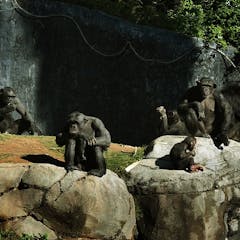
Articles on Chimpanzees
Displaying 1 - 20 of 65 articles

When resources are tight, mothers bear the costs of playing with their offspring even as they avoid socializing with others.

Zoo-based research can teach us about the needs of animals in our care.

Most of us have heard of the dangers of deforestation but there are other more subtle ways that human beings can endanger monkeys, apes and lemurs.

The heart used in the first pig-human transplant was infected with a pig virus. This reveals that using other species as organ donors may not provide a solution for organ shortages.

How Rekambo chimpanzees demonstrate a number of ground breaking behaviours never seen before in animals.

We studied 8,000 primate teeth and finally confirmed that humans are not the only living primate to suffer from cavities. But there are interesting differences.

Art such as the ‘Primal Expressions’ series created by chimpanzees continues to raise important questions about creative instincts in non-human animals.

We’re the only species that can throw at speeds that kill.

The strange journey of Ham the chimpanzee from a rainforest in Cameroon to the edge of space.

To understand the barriers endangered species face when trying to traverse their habitat, it helps to think of their environment like an electrical circuit board.

But with chimps now endangered, we risk losing their forest-rebuilding abilities.

People can still learn a great deal about these mammals while keeping a safe distance.

A quirk of psychology that affects the way people learn from others may have helped unlock the complicated technologies and rituals that human culture hinges on.

Shareable online images of chimpanzees, elephants and other animals are threatening their conservation and welfare.

Attacks on chimpanzees are happening at an alarming rate, within and outside national parks.

As a human evolution researcher, I was very excited to work with the creator of the Assassin’s Creed games.

Can we really know what animals think? A philosopher argues that we can’t, not with any precision.

The way of life primates have evolved to live cannot be replicated in a human home.

Chimpanzees, like humans, possess working memory abilities. They’re able to perform similar to seven-year-old children.

The discovery sheds light on how early humans evolved larger brains and the ability to eat meat.
